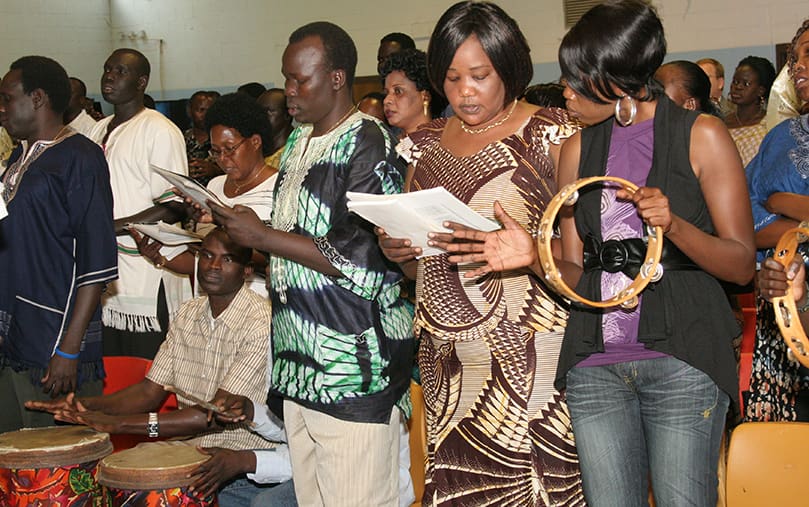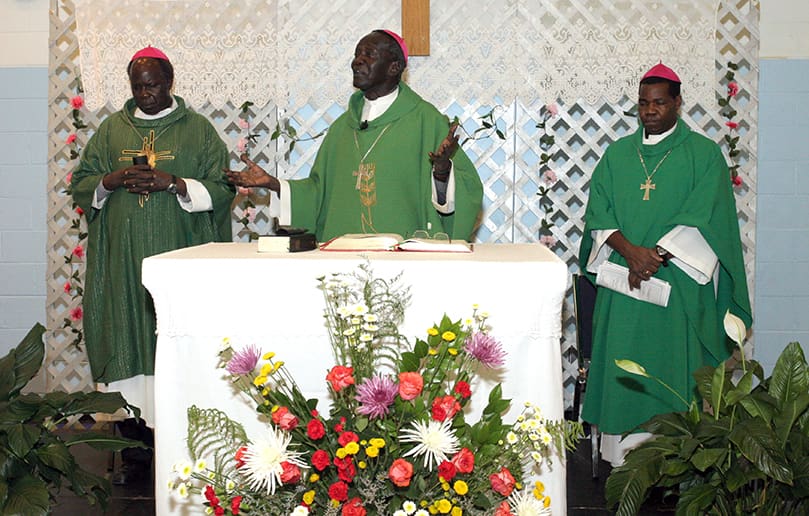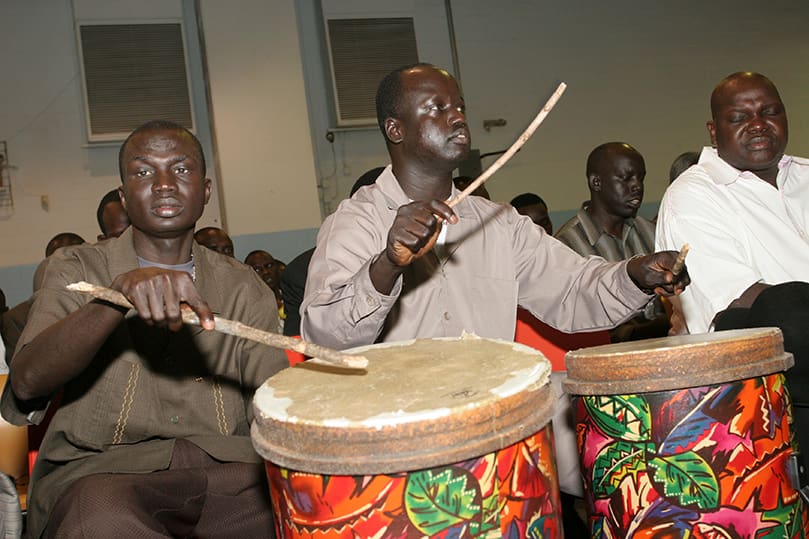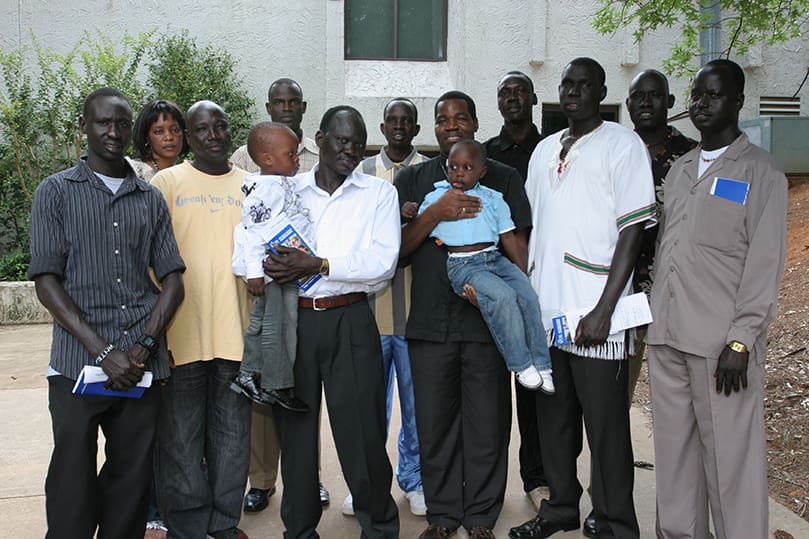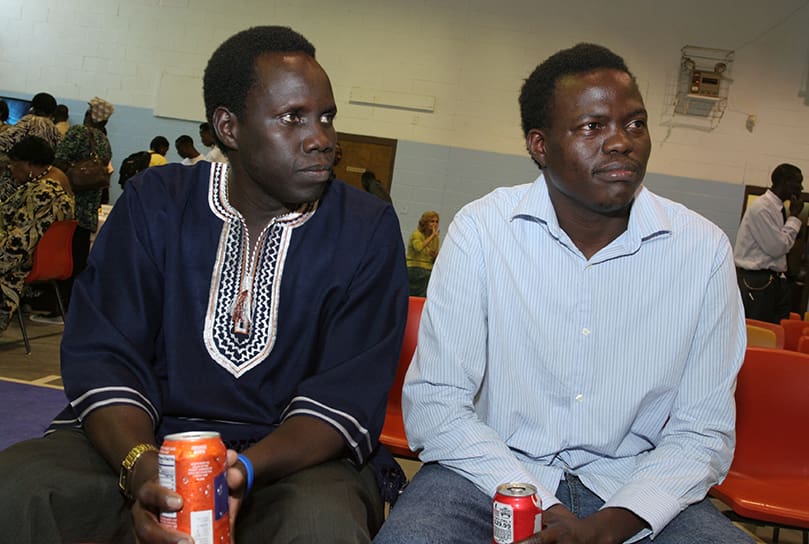Members of the Sudanese choir at Corpus Christi Church, Stone Mountain, sing the opening hymn. The choir, which originally formed in 2000, is under the direction of Philemon Gor. Photo By Michael Alexander
Stone Mountain
Sudanese Bishops Seek Help From Local Community
By ANDREW NELSON, Staff Writer | Published July 8, 2010
Sitting in colorful plastic seats on an indoor basketball court were members of the Lost Boys, the group who, as youngsters, walked for hundreds of miles to escape war, minefields and violence that destroyed their Sudanese villages.
Now, they are entering their 30s. They’ve landed jobs and made lives for themselves here. Among them were Diadi “Lino” Momo, 31, of Atlanta and Duang “Victor” Deng, 31, of Birmingham, Ala.
Despite the wars that drove them from family and into refugee camps and later into exile, they took it to heart when three visiting Catholic bishops from Sudan urged them and other former refugees to contribute to their homeland’s future.
The peril and promise of Sudan were at the forefront of the minds of the estimated 100 women, men and children, as they gathered on Sunday, June 27, in prayer with the bishops, at Corpus Christi Church.
“There is hope and there is fear,” said Momo, who now works in the shipping business.
Deng said in his adopted community there are only a handful of Sudanese, but he talks with school groups and churches about what is happening back in his native land.
The two and a half hour drive to Stone Mountain from Alabama was worth his time and gas money.
“It is very important to see our bishops. We have lived here a very long time. I learn from them,” Deng said.
“They need us to have hope and energy to work hard,” said Magok Marier, 30, about the future of his country, which he fled when his village was burned. He said he was one of the original Lost Boys who settled in Atlanta in 2001.
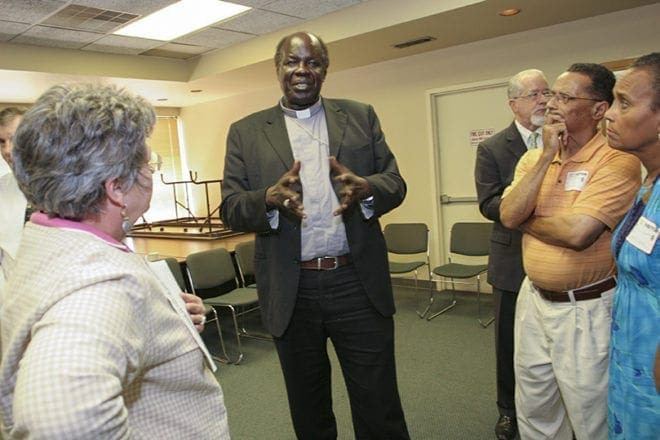
Sudanese Auxiliary Bishop Daniel Adwok Kur, center, holds a discussion with (clockwise, second from right) Larry and Beatrice Soublet of Our Lady of Lourdes Church, Atlanta, and Jutta Hansen, public relations coordinator for Catholic Charities Atlanta. Photo By Michael Alexander
Led in worship by the three bishops, the women and men held onto hope that a scheduled 2011 referendum in Sudan would not return the country to violence that pits the largely Muslim North against the oil-rich South, where people of Christian and animist faiths live. The bishops ended a weeklong trip to the United States in the Atlanta Archdiocese.
“A country that enjoys life more than suffering” is the dream Marier has for his homeland.
Self-Determination
Southern Sudan’s vote on self-determination is scheduled for Jan. 9, 2011. Catholic Relief Services and other humanitarian groups view the polling as more important for Sudan’s future than recent elections for national and regional offices. The vote is on whether the South should secede from the North. It is possible that refugees may even be able to vote, although that is not certain.
“Regardless of whether from the North or South, people want to live in peace. No war, no hunger,” said Peter Uchala, 49, of Clarkston, who was resettled by Catholic Charities of Atlanta.
Bishop Rudolf Deng Majak of Wau, president of the Sudan Catholic Bishops’ Conference, said the trip to the United States was to ring an “alarm bell” about the dire situation in their land. He lived in a refugee camp himself for five years.
Other bishops were Bishop Eduardo Hiiboro Kussala of Tombura-Yambio and Auxiliary Bishop Daniel Adwok Kur of Khartoum.
“We need your prayers, but we also need your voice. If we can influence you … to do your little bit,” Bishop Majak said.
Earlier in the week, the bishops met with government officials and members of Congress to highlight the perilous situation in Sudan. They also visited with Archbishop Wilton D. Gregory.
Sudan has been wracked with one of the longest running wars in Africa, with generations growing up knowing violence and hundreds of thousands forced to find security in refugee camps. A five-year-old ceasefire was implemented with the intervention of the United States, European countries and the United Nations. It is vital the United States and the international community stay engaged and push for a free and fair election, the bishops said.
Political factions are trying to disrupt the vote by confusing people, failing to implement key features before the vote and dividing the people with violence, said the bishops.
“It is a time bomb,” said Bishop Kussala about the situation in his country. “We are saying thank you, but also we need you to continue to work with us.”
Bishop Kussala, who has been a bishop for two years, said his time as the spiritual leader for the 800,000 Catholics in his South Sudan diocese has been focused on peacemaking, as Catholics and other families are threatened by rebels, who kidnap their children and make them into soldiers.
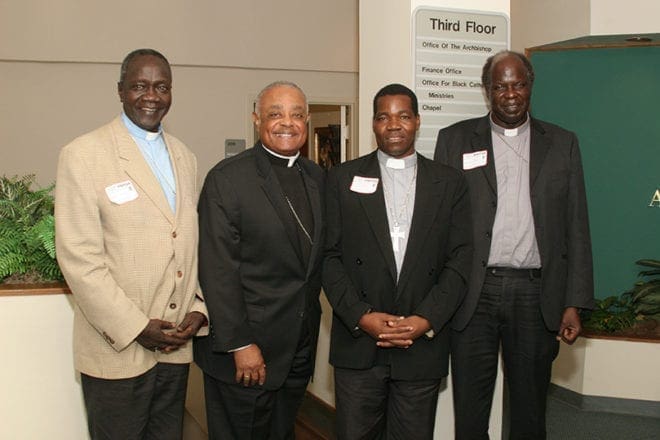
During a June 24 visit to the Catholic Center, Archbishop Wilton D. Gregory, second from left, meets with (l-r) Sudanese Bishop Rudolf Deng Majak of the Diocese of Wau, Bishop Eduardo Hiiboro Kussala of the Diocese of Tombura-Yambio, and Auxiliary Bishop Daniel Adwok Kur of the archdiocese of Khartoum. Photo By Michael Alexander
“The message of Jesus is the message of peace,” he said.
With the assistance of Catholic Relief Services, the international development arm of the U.S. bishops, Sudanese church officials are relaunching the People-to-People Peace and Reconciliation Process. It trains people to gather and to bridge cultural, tribal and religious differences that have built up over six decades of conflict. CRS has dedicated some $4 million to help the country.
“Before you are a Muslim, a Christian, you are a child of God,” said Bishop Majak.
People at the end of life won’t be judged by what tribe they belong to, or the faith they hold, but on how they treat the most vulnerable, the people who are most in need of help, he said.
“Open your eyes. Nobody must play with (the referendum),” Bishop Majak told the crowd of Catholics. The decision, long a dream for the people, rests with this generation of Sudanese, he said. Vote on the matter “for the children of our children,” he said.
“Delighted, Consoled, Grateful”
Bishop Majak told the gathering in the gym at Corpus Christi, “We are more joyful than you are to come and celebrate with you.”
He said the three bishops were “delighted, consoled, grateful” to worship with the community at the end of their trip to the United States.
But they weren’t the only ones excited about the opportunity.
Uchala, a father of four, said the Sudanese community around Atlanta was joyful with the opportunity to visit with the bishops.
“We are really very happy. It shortens the distance between here and Sudan,” said Uchala, who has been here for 10 years.
Bishop Majak spoke highly of the welcome extended by America to refugees and he urged people to work hard, learn skills and “be like a (honey) bee” picking up the good from the American culture and leaving the rest.
“Pray for the people of Sudan. Be ambassadors for Sudan,” he said. “There is a lot of work to do,” he said.
